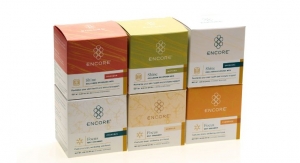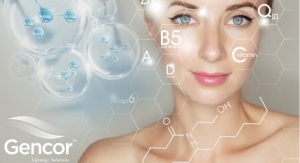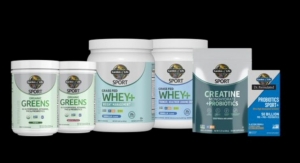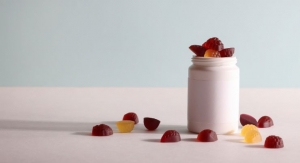09.07.10
New ‘BeautySleep’ Supplement Hits the Market
Big Quark LLC, St. Louis, MO, has released a new product called BeautySleep, a 2-oz. dietary supplement that combines anti-aging compounds and cell-protecting antioxidants with sleep enhancers. The product is designed for Baby Boomer women “who want to maintain their youthful appearance while providing a better night’s sleep.” Some of the notable ingredients include GABA (gamma amino butyric acid), melatonin, lycopene, lutein, valerian and Sensara, a branded ingredient that is clinically proven to: “maintain skin elasticity and tone; slow effects of aging; and protect cellular and tissue health.”
The company says Baby Boomers have an estimated $2 trillion in annual spending power and are clearly the largest and most influential consumer segment in the CPG (Consumer Packaged Goods) category. Within that market, anti-aging is the fastest growing segment—at $30 billion currently and forecasted to grow to $70 billion in the next three years.
During sleep, the company explains, is when your body naturally repairs itself from the day’s damage. So if you are not sleeping enough or deeply enough, then “you are not allowing your body to properly repair itself,” which can actually cause additional stress and faster aging. BeautySleep, the company claims, “helps you get that rejuvenating sleep while nourishing and protecting the skin and body with needed vitamins, minerals antioxidants and anti-inflammatories.”
Survey Finds People Confused About Skin Cancer Risks
When it comes to tanning, dermatologists have long suspected that most people need an attitude adjustment. Now, results of a new survey by the American Academy of Dermatology (AAD) have confirmed that the majority of people still idolize the bronzed look of a tan despite wanting to protect themselves from skin cancer.
The “Suntelligence: How Sun Smart is Your City?” online survey polled more than 7000 adults nationwide to determine their knowledge, attitudes and behaviors toward tanning, sun protection and skin cancer detection. Twenty-six cities were ranked based on respondents' answers to several questions in each category.
“Our survey highlighted the contradictory feelings that many people have about tanning—they like the way a tan looks but are concerned about skin cancer, which is estimated to affect about one in five Americans in their lifetime,” said dermatologist Zoe Draelos, MD, FAAD, consulting professor at Duke University School of Medicine, Durham, N.C. “What they may not realize is that no matter whether you tan or burn, a tan from the sun or tanning beds damages the skin and can cause wrinkles, age spots and skin cancer. The challenge is changing the long-standing attitudes about tanning to correlate with people’s knowledge about skin cancer.”
In examining the survey data, Dr. Draelos noted that 72% of all respondents agreed that people look more attractive with a tan. In addition, more men than women (76% vs. 68%, respectively) agreed with that statement.
Similarly, 66% of all respondents agreed that people look healthier with a tan. Once again more men than women (70% vs. 62%, respectively) agreed with this statement.
When asked whether or not they believed that sun exposure is good for your health, 60% of all respondents mistakenly agreed with this statement. Analyzing the data by gender, more men than women (62% vs. 58%, respectively) incorrectly thought that sun exposure is healthy.
“Various reports touting the potential health benefits of sun exposure for vitamin D production are misleading people to believe that exposing oneself to UV radiation—which causes cancer—to prevent another disease is somehow beneficial,” said Dr. Draelos. “In fact, the [American] Academy [of Dermatology] does not recommend getting vitamin D from any form of UV exposure because UV radiation from the sun and tanning beds can lead to the development of skin cancer. Getting vitamin D from a healthy diet, which includes naturally enriched vitamin D foods, fortified foods and beverages, and/or vitamin supplements is a healthier alternative because it provides the exact same benefit without the skin cancer risk.”
Consumers Favor Brand Names Over Claims of ‘Organic’ or ‘Natural’
Consumers require more education about the effectiveness and product claims of organic and natural cosmetics to justify paying a premium price, according to findings from a recent U.S. study conducted by market research firm Kairos Consumers, Chicago, IL. The Kairos study, which included store audits and focus groups, highlights consumers’ general lack of knowledge about the ingredients in organic and natural cosmetics, even though these consumers may regularly purchase and are knowledgeable about organic food.
Cosmetics shoppers place a greater emphasis on product performance than the safety and wholesomeness that organic and natural skin care brands signify. Because consumers seem to know and understand conventional cosmetic claims, or be more familiar with the brand names, they tend to favor buying them over products labeled organic or natural.
Those consumers buying organic and natural cosmetics admit they don’t know a great deal about what constitutes an organic or a natural product. When asked what they believe makes a natural or organic product appealing to them, cosmetics buyers said safety and the absence of certain “negative” ingredients.
“Cosmetic shoppers told us they believe cosmetics are deemed safe when they are free of ingredients they view as ‘bad,’ such as parabens, dyes and chemicals. They also place great importance on the brand’s reputation in the organic or natural marketplace, making brand familiarity an important influencer of cosmetic decisions,” explains Betsy Hoag, Kairos Consumers co-founder.
“Enormous opportunity exists for both manufacturers and retailers with established brands in organics or naturals, as consumers place great importance on familiar names. Smaller, lesser known brands can also succeed by educating organic shoppers about the effectiveness of organic and natural ingredients as many consumers in the study indicated a desire for this information.”
Botanical Acne Solution Launched
Acne is one of the most common skin diseases in the U.S., affecting about 60 million people, according to the American Academy of Dermatology. Acne has multiple triggers, including oily skin, bacteria, lipid oxidation and DNA damage. All of these triggers can initiate inflammation, which plays a critical role in the development of deeper acne lesions and scarring. Recent studies show that controlling inflammatory triggers is not enough. Once initiated, inflammation enhances itself via secondary damage leading to a pro-inflammatory cycle and deeper lesions.
Z-Care, a new ingredient from Israel-based Frutarom, is a proprietary blend of botanical ingredients based on traditional Chinese medicine for the support of oily and acne-prone skin. By applying modern science to traditional medicine the result is an effective-yet-natural acne solution for topical applications, the company says.
“Z-care fights acne by targeting the inflammatory cycle itself—not just its triggers,” explains Anat Stern, MSc, product manager, Cosmetic Ingredients, Frutarom. “The result is an all-in-one solution, unlike most traditional acne-control products, which focus on cleansing or sebum control.”
Lip Smackers Introduces Vitaminwater-based Lip Balms
Lip Smackers has launched a new line of lip balms based on the popular enhanced water line, Vitaminwater. Called Vitaminschtick, the line contains all the flavors of “your favorite vitamin water with a dose of healthy goodness to keep your lips invigorated.”
Packed with vitamin E and SPF, the new flavored lip balm line by Lip Smackers “restore, refresh and protect lips against environmental damage.”
Vitaminschtick comes in these Vitaminwater flavors: Power-c (Dragonfruit flavor); XXX (Acai-Blueberry-Pomegranate flavor); Focus (Kiwi Strawberry flavor); Multi-V (Lemonade flavor); Formula 50 (Grape flavor); Essential (Orange-Orange flavor); Revive (Fruit Punch flavor); and Energy (Tropical Citrus flavor).
New Test Kit Helps Predict Chances of Developing Cellulite
Molecular dermatology research and development innovator DermaGenoma, Inc., Irvine, CA, has released the CelluliteDX Genetic Test for Moderate to Severe Cellulite (gynoid lipodystrophy). The test helps doctors predict if a patient is at high risk for developing Nurnberger-Muller grade 2 (or greater) cellulite. According to the company, the information allows a doctor to develop a plan, which may include therapy and/or lifestyle changes to help reduce the risk of developing moderate to severe cellulite.
Existing therapies are unlikely to reverse severe cellulite once it has occurred; however, early lifestyle changes including exercise, medication choices (i.e., avoiding birth control and hormone replacement therapy), and therapies, such as laser therapy, may slow or stop development of severe cellulite and improve visual aesthetics.
“Even though cellulite affects a large percentage of women, very few scientific studies have attempted to understand the underlying molecular and physiological basis. Our study of cellulite is a breakthrough in the understanding of the cause of cellulite, and ushers in an era of new potential therapies,” said Enzo Emanuele, MD, research fellow at the University of Pavia, Italy.
CelluliteDX reports the presence or absence of a specific variation in the angiotensin converting enzyme (ACE) gene, which has an important role in the cardiovascular system. “The CelluliteDX test is most appropriate for women who have not yet developed moderate to severe cellulite and may have a family history of cellulite,” explained DermaGenoma CEO Andy Goren. A patient testing positive for the ACE variant has approximately a 70% chance of developing moderate to severe cellulite.
New Botanical Anti-Aging Ingredient Launched
Lacey, WA-based Unigen, Inc., has launched Nivitol, a botanical anti-aging skin care ingredient. Unigen has entered into multiple global license and supply agreements for Nivitol with manufacturers and marketers of skin care, makeup, fragrance and hair care products.
Nivitol is a natural botanical alternative, derived from the novel plant extract Dianella ensifolia, which has been scientifically proven to visibly improve skin appearance. Nivitol contains a unique enzyme-blocking, or tyrosinase-inhibiting, agent that reduces skin pigmentation and safely lightens skin color without any adverse side effects often found with harsh chemicals.
According to the company, clinical studies have shown Nivitol to be up to 20 times more effective than the leading whitening agents such as hydroquinone and kojic acid. It has been thoroughly safety tested by independent third party institutes and has shown no adverse side effects.
Study Shows Lycopene Helps Protect Against Sun Damage
Clinical evidence demonstrates that just one day of unprotected sun exposure can cause irreversible cell damage, which is associated with both morphological and histological changes. These changes can lead to premature aging of the skin. “It only takes small amounts of daily sun exposure, such as walking to and from the car, or to the supermarket to start skin damage,” says David Djerassi, wellness and nutricosmetic expert for Israel-based LycoRed, Ltd. “Yet, despite highly publicized dermatologist recommendations and rising skin cancer rates, few people apply sunscreens every day. A Lyc-O-Mato capsule consumed in the morning, with breakfast, may be an easy and effective way to help protect skin from the damaging effects of UV radiation that can lead to premature aging, or even skin cancer.”
In a 10-week study, one group supplemented daily with Lyc-O-Mato capsules and the second group supplemented with a placebo (soy oil). After the supplementation period, the subjects were exposed to two MEDs of UVB and UVA radiation. Skin biopsies taken from the volunteers were analyzed to determine the number of sunburn cells formed after the exposure to radiation. Sunburn cells are dead cells, indicative of DNA damage caused by UVB and UVA light. The number of sunburn cells found for the Lyc-O-Mato group was significantly lower compared to the number found for the placebo group. Fewer sunburn cells indicate less skin damage, which can manifest itself as premature aging and wrinkles.
BioCell Extols Beauty Benefits of Collagen
BioCell Collagen II is a naturally occurring matrix containing highly bioavailable collagen peptides and depolymerized glycosaminoglycans such as hyaluronic acid (HA). Various studies have demonstrated that BioCell Collagen II is a healthy aging ingredient promoting youthful looking skin as well as active joints. Its molecular nature and biological properties substantiate inside-out skin benefits via delaying or minimizing the effects of both natural and photoaging processes.
First, the company explained, the most important layer for skin health is the dermis, which is composed of a collagen/elastin fiber network embedded with various ground substances such as HA and proteoglycans. BioCell Collagen II replenishes building blocks of these macromolecules. In healthy skin, their biosynthesis and degradation is well balanced to produce a strong and dense network into which HA and other dermal components are interweaved, leading to a well-hydrated, supple and young-looking appearance. However, in aging skin, they are degraded to cause the disintegration of the matrix and the loss of water-retaining ability. These events, unless intervened, eventually give rise to the generation of wrinkles and fine lines.
The company also pointed out that BioCell Collagen II is made via a proprietary process so that molecular weights of collagen and HA are optimally reduced to ensure effective absorption and higher bioavailability. Humans taking BioCell Collagen II daily were shown to increase HA levels in their blood as much as 60-fold as compared to the baseline levels. Elevated HA levels should be beneficial for naturally aging skin and also for the skin under extrinsic stress caused by sun exposure, smoking and alcohol consumption, because these aging processes involve the degradation of HA. Interestingly, recent studies have demonstrated that hydrolyzed collagen protects UV-mediated skin damage such as epidermal hypertrophy, dermal dehydration, and loss of collagen.
“This suggests that BioCell Collagen II’s natural matrix of hydrolyzed collagen and HA can be synergistic in protecting the skin from detrimental photoaging effects,” the company said.
Lastly, BioCell Collagen II harbors a unique biological activity, inhibition of hyaluronidase, which differentiates itself from other dietary ingredients for skin health. “This has a profound implication related to healthy aging,” the company said, adding, “HA is found in virtually all tissues including the skin, the joints, and bodily fluids. As we age, its content and size decrease via the action of hyaluronidase, and HA with shortened chain length and decreased polyanionic charge contributes to skin sagging and wrinkle formation because poor retention of water causes shrinkage and disarray of dermal matrix. Thus, inhibition of hyaluronidase by BioCell Collagen II implies that its ingestion may promote hydrated, younger-looking appearance from the inside out via helping maintain the healthy size and levels of HA.”
Dermaval Inhibits Elastase Activity
Elastase is an enzyme associated with the deterioration of elastin, a protein that is a vital part of elastic fibers in the skin. Initial study results show that Dermaval, a new beauty-from-within ingredient from Futureceuticals, Momence, IL, inhibits elastase by up to 10% in human subjects within two hours after ingestion. This research was conducted using Futureceuticals’ proprietary TargeTest biotesting platform.
Currently, antioxidants are usually highlighted in many beauty-from-within products based upon the premise of their ability to fight free radicals. While antioxidants may have a certain amount of importance, the company believes there is little science supporting a direct association between ingestible antioxidants and any measurable changes of markers known to affect skin health. Additionally, new science suggests that antioxidants represent just a small piece of the beauty-from-within story.
(Excerpted from the report “10 Key Trends in Food, Nutrition & Health 2010,” published by New Nutrition Business, U.K.)
The idea of foods and beverages to boost skin health and “beauty” started in Japan and there have been repeated efforts to make the concept fly in the West. But even in the most active market—the U.S.—the inner-beauty segment had sales of barely $1 million as recently as 2006. Challenges lately have made some forecasts—such as that predicting inner beauty would reach $1.3 billion by 2011—look increasingly far-fetched.
One thing is for sure: for now, Europe is not a good opportunity for skin and beauty foods and beverages, thanks to its health claim regulations. The bigger opportunities lie in the U.S., Asia and South America.
Yet there are some significant lessons to be learned from the European market, where Danone has made the most successful—yet ultimately unsuccessful—foray into beauty foods ever attempted.
The launch of Danone’s Essensis yogurt brand was a bold move and a good example of a company willing to take the risk of trying to create a new category—as Danone has already done before successfully with its Activia and Actimel brands.
Packaged in an eye-catching shade of rose, Essensis carried a claim that it would “nourish your skin from the inside,” with the benefit delivered by the ingredient complex “ProNutris”—vitamin E, green tea, probiotics and borage oil. It was the first product of its kind on the European market from a significant company.
Danone’s marketing of Essensis cannot be faulted. In France alone, the company spent more than $11.5 million promoting the brand in 2007, using a marketing approach that was unavoidable in a business in which its concept would have to appeal to consumers as much as the cosmetics brands marketed by high-spending giants such as L’Oréal.
Essensis’ advertising strongly echoed that of cosmetics and Danone invested in dedicated merchandising units and sampling areas. At one point, Essensis even went on sale in a chain of beauty salons—meaning that it was available in the place where the women most likely to be interested were present and thinking about skincare.
Initially, Essensis got a warm reception from beauty consumers and retailers and was rapidly rolled out to Belgium, Spain and Italy. But as experienced marketers know, it’s one thing to get an initial spike of sales, it’s quite another to get the levels of repeat purchase once the initial consumer curiosity has abated.
Lessons Learned
It was sold in the supermarket dairy aisle: One factor simply may be that it was merchandised in the supermarket alongside the regular yogurt, where it was easy for consumers to see that it sold at quite a premium to regular yogurts. Essensis wasn’t differentiated enough to justify a price premium; the only thing that set it apart from other yogurts was its beauty benefit. This benefit had to perform as the sole reason to purchase.
Supermarkets are often the worst place to sell a product. Your package can become invisible among the thousands of other products, and finding the right aisle to put your product in can be a nightmare—especially when it brings, as Essensis did, a new benefit that’s unfamiliar to consumers and not one that consumers have ever before associated with the dairy category.
Can’t feel the benefit: Delivering a benefit that the consumer can quickly see or feel is one of the most compelling advantages that a product can have—particularly when an economic downturn is causing people to think more carefully about how they spend their money. The buyers of Essensis could not see or feel themselves becoming “more beautiful,” even though the benefit was, Danone said, clinically demonstrated. In fact, Essensis communicated that it could take up to six weeks for visible results to show. No one is willing to wait that long for results, so buying Essensis became a matter of faith and “belief” rather than tangible, quick results.
Too much trouble to get the benefit: The recommended daily intake of Essensis to get the claimed effect was two pots a day. For most people, that’s just too much effort. For consumer acceptance a single dose is the most that people can be expected to discipline themselves to do.
Too much money for a substitute: Anyone consuming the recommended two pots a day would have been spending $51 a month, or $617 a year. As a regimen, that’s a cost comparable with using one of the leading brands of face-cream. The question for many women—especially in times of tighter personal budgets—would be whether they could justify that as an additional expense, which would only be possible if there was a clear effect. Few would be willing to substitute Essensis for their favorite—and trusted—brand of skincare lotion.
New and unfamiliar benefits take time to get established: The idea of skin care benefits from food is still new and relatively unknown in the West. As Danone said itself when announcing the withdrawal of Essensis, such new concepts take time to get established. But with food markets tight, consumers more unwilling to try new and expensive ideas and pressure on Danone to produce ever-more profits, there would have been little management patience with slowly building a niche brand (and limited resource to do so). That’s a pity, because in reality sales of $74 million in its first year is an excellent performance for any brand and—had the problems with the proposition been ironed out—might have provided a basis for long-term growth.
‘Share of mind’ for beauty belongs to topical products: The benefit of “nourishes your skin” is already addressed by hundreds of skin care lotions and creams. The concept of topical application has the dominant “share of mind” among consumers, and brands such as L’Oréal or Estee Lauder have, thanks to decades of massive marketing spend, a massive share of mind. Acquiring even a tiny share of mind in competition with such brands seems like an impossible task.
Wrong format?: We could be wrong, but a yogurt doesn’t seem like a very credible format for the benefit of beauty. Juice or water—with its image of naturalness, purity, and fruit—used in imagery heavily by cosmetic brands might be a better vehicle. Water brands with a claimed skin care benefit, such as Contrex and Vichy Celestins, have performed well enough to survive.
New Nutrition Business, based in London, U.K., is dedicated to researching, analyzing and forecasting the global nutrition business. Its journal of the same name provides case studies and analysis of the global nutrition business and is used by more than 1700 corporate subscribers in 42 countries. For more information, www.new-nutrition.com.
Everyone knows that getting an adequate daily dose of vitamins and minerals is important in maintaining one’s overall health, but many question whether or not the vitamins touted in skin care products work in reducing the signs of sun-damaged skin. A recently published study reviewed the published scientific literature to determine what evidence exists to support the use of vitamins in skin care products to slow or reverse the effects of sun damage.
In the report, titled “Vitamins and photoaging: Do scientific data support their use?”, published online in the Journal of the American Academy of Dermatology, dermatologist Jenny Kim, MD, PhD, FAAD, associate professor in the division of dermatology, Department of Medicine, at the University of California, Los Angeles (UCLA), David Geffen School of Medicine in Los Angeles, presented results of a study that may support the use of certain vitamins in oral or topical formulations.
“It is well documented that ultraviolet (UV) radiation contributes to premature skin aging through the process of photoaging, and there is increasing evidence that the antioxidant properties of vitamins may contribute to the prevention and treatment of photoaging,” said Dr. Kim. “In fact, numerous companies developing cosmeceuticals base their effectiveness claims on the fact that their formulations contain vitamins proven in laboratories to modify cellular processes thought to contribute to the appearance of photoaged skin. As dermatologists, we can help our patients navigate this maze of marketing claims by sharing scientific data on the known efficacy of vitamins in skin care products.”
Based on a comprehensive review of the available published data on the role of vitamins in skin care products, Dr. Kim and her colleagues, Jamie Zussman, MD, FAAD, and Jennifer Ahdout, MD, found there is evidence to support the potential role of vitamins A, C, E, and B3 in modifying the photoaging process.
“While it’s evident that these vitamins can play a role in fighting sun damage, the question still remains whether these properties are effective when delivered in skin care products,” Dr Kim said.
Vitamin A: Effective in Treating a Variety of skin conditions
The two most common forms of vitamin A studied for their role in protecting the skin from UV-induced damage are retinols and carotenoids. Retinol is found in foods such as liver, milk, and eggs, and is the most biologically active form of the vitamin. Carotenoids are found in many fruits and vegetables, and have strong antioxidant capabilities.
Carotenoids are not shown to be beneficial in the treatment of photoaging, but research suggests that they might play a role in photoprotection by preventing UV-induced collagen breakdown.
“Although the evidence available at this time is not strong enough to offer definitive support for the use of dietary carotenoids for photoprotection, a role for carotenoids as a supplement to photoprotective agents should not be discounted yet,” said Dr. Kim. “We hope to see larger-scale clinical trials conducted to further explore the photoprotective effects of carotenoids.”
Vitamin C: Possible Skin Care Product Value
Vitamin C, a water-soluble vitamin (also known as ascorbic acid) that is found in citrus fruits and dark green leafy vegetables, plays an essential role in the production of collagen and elastin. Because of its antioxidant properties, vitamin C may reverse the negative effects of UV radiation in the skin, but there are few clinically controlled studies to confirm this theory.
“An animal study examining the role of vitamin C in reversing sun damage found that when 5% ascorbate was applied two hours before UVB and UVA exposure, UVB-induced skin wrinkling was reduced,” said Dr. Kim. “Some of the human clinical trials have shown similar favorable results when applying a daily dose of L-ascorbic acid treatment, but all of these studies involved small sample sizes.”
In addition, Dr. Kim pointed out that one concern of adding vitamin C to cosmeceuticals is that vitamin C is unstable when used in formulations and it is not known how much, if any, intact molecule remains when applied to the skin.
“This problem has been partially overcome by chemically modifying ascorbic acid,” said Dr. Kim. “However, for the body to use the supplied ascorbic acid, it must convert it to L-ascorbic acid and many of the stabilized, commercially available forms have not been examined
to determine whether this conversion is possible. For that reason, the average consumer will not be able to determine if a cosmeceutical containing vitamin C will be effective.”
Vitamin E: A Primary Antioxidant
Vitamin E, or tocopherol, is a fat-soluble vitamin and its synthetic form is found in many over-the-counter products. Working as an antioxidant, vitamin E protects cell membranes and is thought to play an important role in skin aging because of its antioxidant properties. While topical vitamin E is available in a variety of products, there is no data that support claims that it improves skin wrinkling, discoloration and texture.
“Topical vitamin E has been studied in humans, as in mice, more as a protectant to be used before sun exposure than as an agent to be included in cosmeceuticals to reduce the signs of skin aging,” said Dr. Kim. “Through research we have learned that UV exposure significantly decreases levels of cutaneous vitamin E, and vitamin C should be included in any formulation containing vitamin E because of the important role it plays in maintaining active vitamin E levels.”
Research also has explored combining vitamins E and C as an oral supplement to provide sun protection. Multiple studies suggest that this combination therapy is beneficial for photoprotection.
Vitamin B3: A Possible Treatment for Photoaging
The B vitamins consist of eight different water-soluble vitamins that are found in a variety of foods. Vitamin B3 has been shown to reduce blood cholesterol and atherosclerosis (a condition in which fatty materials collect along artery walls), but now new insights are examining its role as an effective treatment for several skin conditions—from acne to photoaging.
Specifically, Dr. Kim noted that vitamin B3 has been found to increase collagen production in in vitro studies and to reduce skin hyperpigmentation (dark spots) in clinical studies.
“There has been one clinical trial conducted in Caucasian women in which 50 women applied 5% niacinamide (topical vitamin B3) to one side of their face twice per day for 12 weeks, and these women experienced significant reductions in the appearance of hyperpigmented spots, redness, wrinkles and yellowing, as well as improved skin elasticity,” said Dr. Kim. “While initial studies show promise that topical vitamin B3 may prevent UV-induced skin aging, larger clinical trials are needed to confirm its role as a definitive treatment of photoaging.”
Conclusion
Dr. Kim said it is important for everyone to get an adequate daily supply of vitamins to maintain a healthy lifestyle, and that any insufficiencies may negatively impact the skin’s overall appearance.
“Research has shown a potential role for various vitamins in reducing the damaging effects of sun exposure on the skin. Whether topical or oral formulations containing these vitamins have a protective effect is uncertain. Given the number, type and variability of preparations available, consumers should understand from our study that skin care products with vitamins may not provide clinically meaningful improvement,” said Dr. Kim. “What is known is that proper sun protection is key to the prevention of photoaging and should be top of mind at all times.



























